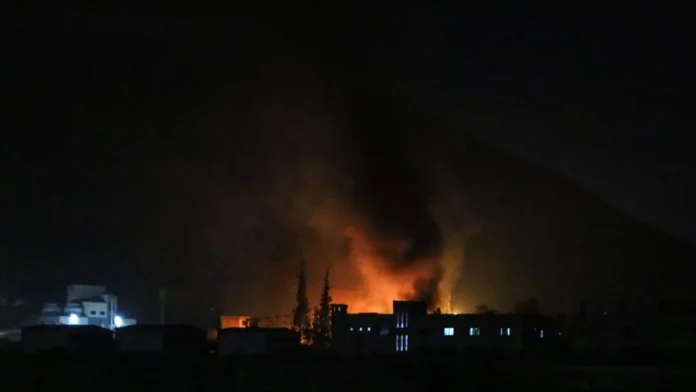Smoke billowed over the outskirts of Damascus on December 9 following a series of Israeli airstrikes targeting military facilities in Syria.
The strikes, which reportedly exceeded 100 in number, focused on sites linked to Syria’s chemical weapons program, including a research center suspected of connections to chemical weapons production.
The airstrikes have sparked a global outcry, with concerns over the potential destruction of valuable evidence related to the country’s past use of chemical weapons.
The Israel Defense Forces (IDF) stated that the strikes were intended to eliminate remaining stockpiles of chemical weapons, long-range missiles, and rockets.
Israel’s goal, according to an official statement, is to prevent such weapons from falling into the hands of extremist groups.
However, the international community is increasingly worried about the potential ramifications of these attacks, especially regarding the impact on ongoing investigations into Syria’s chemical weapons use.
Fernando Arias, Director-General of the Organisation for the Prohibition of Chemical Weapons (OPCW), expressed alarm over the potential risks associated with the strikes.
In a recent speech, Arias explained that while the OPCW is closely monitoring reports of the attacks, the agency has not yet determined whether chemical weapons sites were directly affected.
He warned that the airstrikes could lead to contamination and the loss of critical evidence that could aid future investigations into Syria’s chemical weapons history.
The OPCW has been actively involved in investigating the use of chemical weapons in Syria since 2014.
The organization has documented 74 instances of alleged chemical weapons use in the country, with investigations concluding that chemical weapons were used or likely used in 20 of these cases.
The strikes on military sites could jeopardize ongoing efforts to gather evidence that could be crucial in holding responsible parties accountable for the use of chemical weapons in the country.
Arias highlighted two major risks arising from the airstrikes: contamination and the potential loss of evidence.
“Such airstrikes could create a risk of contamination,” he stated, “while also threatening to destroy valuable evidence for investigations by different independent international bodies.”
The OPCW’s fact-finding mission has long been a critical tool in verifying allegations of chemical weapons use, and any damage to sites could severely hinder the ability to track and analyze Syria’s chemical weapons activities.
Moreover, Arias raised concerns about the possibility of dangerous chemicals or equipment being lost without proper control.
Given the complexities of chemical weapons programs, the destruction or contamination of key sites could lead to the irreversible loss of crucial data, making future accountability efforts even more challenging.
Global concerns about Syria’s chemical weapons stockpile have intensified since the fall of Bashar al-Assad’s regime.
Although the Syrian government officially declared that it had dismantled its chemical weapons program under international supervision, reports and evidence of continued chemical weapons use have persisted.
The international community, including both Western powers and independent investigative bodies, continues to press for accountability regarding Syria’s chemical weapons legacy.
The recent Israeli airstrikes add a new layer of uncertainty to an already volatile situation.
As the OPCW monitors the aftermath of the strikes, it remains to be seen whether Syria’s chemical weapons sites have been damaged or destroyed, and what impact this will have on future investigations into one of the most heinous uses of weapons of mass destruction in the 21st century.

